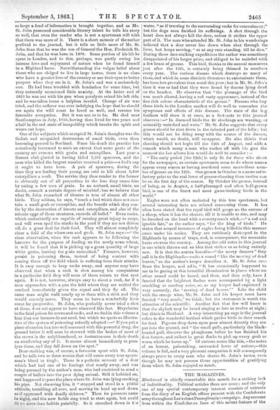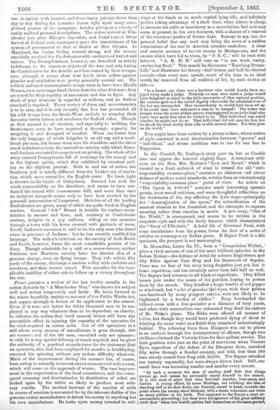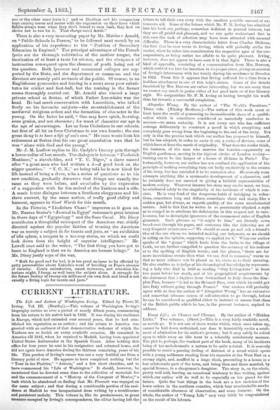THE MAGAZINES.
Blackwood is chiefly remarkable this month for a striking lack of individuality. Political articles there are none ; and the only one of any special contemporary interest consists of extracts from the diary of an English officer present with the Confederate army throughout Lee's short Pennsylvanian campaign. Any account from within the Confederate lines of this salient feature of the
war is replete with interest, and these hasty jottings down from day to day during the iavasion throw light upon many unex- plained phases of the campaign, besides giving us a variety of easily realized personal descriptions. The writer arrived at Win- chester just after Milroy's expulsion, and found a moat bitter hatred of Federal rule, consequent upon the resemblance of his system of government to that of Butler at New Orleans. In Maryland, the Union feeling seemed strong, and the women especially received the Confederates with-undisguised hatred and taunts. The Pennsylvanians, however, are described as utterly indifferent to the causes or objects of the war, and only bating the Confederates for the trouble and loss caused by their occupa- tion, although it seems clear that Lee's strict orders against plunder and retaliation were pretty generally carried out. The wildest and most unmanageable troops seem to have been Hood's Texans, even more ragged and dirtier than the other divisions; they are noted for their rapidity of movement and élan in fight. Any shade of gray whatever is regarded as uniform, and no further standard is required. Every variety of dress and accoutrements is to be seen, and it is only recently that Lee has persuaded all his wild troops from the South-West entirely to abandon their favourite bowie knives and revolvers for Enfield rifles. Though at first unused to all exertion, and especially to walking, the Southerners seem to have acquired a thorough capacity for roughing it and disregard of comfort. When one learns that the only baggage of whole brigades is an old rug and a tooth- brush per man, the former worn over his shoulders and the latter stuck in his button-hole, the marvellous celerity with which Stone- wall Jackson executed his coups is not surprising. The whole of the army entered Pennsylvania full of contempt for the enemy and in the highest spirits, which they exhibited by constant yell- ing on the slightest pretext. Both in and out of action, the Southern yell is totally different from the Yankee cry of exulta- tion, which more resembles the English cheer. No fresh light is thrown on the battle of Gettysburg. General Lee took the whole responsibility on his shoulders, and seems to have con- ducted the retreat with consummate skill, and more than once an incipient stampede seems only to have been averted by the personal intervention of Longstreet. Sketches of all the leading
Confederates are given, many of which are quite fresh to English readers. General " Jeb " Stuart is notable for various eccen- tricities in manner and dress, and, contrary to Confederate custom, delights in a gay uniform, riding on one occasion through a town with his horse covered with garlands of roses.
Ewell, Jackson's successor, is said to be the only man who dared swear in presence of Jackson ; but he has recently modified his language. The writer's criticism on the cavalry of both North and South, however, forms the most remarkable portion of his diary. Though admirable for a raid or a reconnaissance, neither Southern - nor Northern cavalry have the faintest idea of a
genuine charge, even on flying troops. They ride within fifty yards of the enemy, discharge a random volley with carbines and revolvers, and then swerve round. This accounts for the inex- plicable inability of either side to follow up a victory throughout the war.
Fraser „contains a review of the last twelve months in the cotton districts by " A Manchester Man," who knows his subject well and writed temperately and fairly. He looks forward to the winter hopefully, mainly ou account of the Public Works Act, and argues strongly in favour of its application to the utmost. Even if it were not better for thirty thousand mon to be em- ployed in any way whatever than to be dependent on charity, be ridicules the notion that hard manual labour will have any perceptible effect in injuring the capacity of the operative for the work required in cotton mills. Out of 400 operatives in a mill where every process of manufacture is gone through, 300 are women ; out of the 100 men, one-third only are spinners ; in only 21 is any special delicacy of touch required, and he gives the authority of a practical manufacturer for the statement that an operative, who had been employed for months in bricklaying, resumed his spinning without any serious difficulty whatever. Much of the improvement during the summer has, of course, been owing to annually recurrent causes unconnected with cotton, which will cease on the approach of winter. The vast improve- ment in the organization of the local committees, and the conse- quent economy and discrimination in distribution of relief, are looked upon by the writer as likely to produce most salu- tary results. The marked increase of the number of mills in course of erection is accounted for by the inherent dislike of the genuine cotton manufacturer to invest his money in anything but his own manufacture. He looks upon money invested in rail-
ways or the funds as so much capital lying idle, and infinitely prefers taking advantage of a slack time, when labour is cheap, to increase his mills or machinery as a speculation, bad as it may seem at present, in his own business, with a chance of a renewal of the enormous profits of former days. Strange to say, too, the general belief that any mail may bring the news of a sudden termination of the war in America remains unshaken. A clear
and concise account of recent events in Madagascar, and the causes which have led to them, by " P. B. C.," will be read with interest. " A. K. H. B." still runs on " in one weak, washy, everlasting flood." This month he discourses "Touching Dream- Life," and illustrates his theory—half truism and half far-fetched
conceit—that every man spends much of his time in an ideal world, far removed from all realities of life, by such stories as this :—
"In a former age there was a barrister who would keenly have en- joyed being made a judge. Probably no man ever made a judge would have delighted so much in the little accessories of that eminent position, the curious garb and the varied dignity wherewith the administrators of the law are surrounded. How tremendously he would have been set up if he could once have sentenced a man to be hanged ! The writer was present when the name of that person was suggested to an individual who could have made him what he wished to be. That individual was asked whether he might not do so. That individual did not open his lips, but he shook his head slowly from side to side several times. For thus goes on the world."
This might have been written by a penny-a-liner, whose notion of style consisted in neat discrimination between "person" and "individual," and whose ambition was to rise for one line to Tupperism.
In the Cornhill, Mr. Trollope's story goes on, but as Crosbie does not appear the interest slightly flags. A trenchant criti- cism on the Hon. Mrs. Norton's " Lost and Saved," which is treated as a fresh outbreak of what is termed the old " anti- respectability common-place;' contains an elaborate and clever defence of modern social standards, written from an ostentatiously " respectability-common-place " point of view. Au article on "The Opera in 1833-63 " contains much interesting operatic gossip, more sound criticism, and some thoughtful reflections on the tendencies of the day affecting the lyric stage—principally the " demoralization of the opera," the subordination of the musical element to the theatrical, and the attempts to express meaning rather than emotion in music. A new story, "Out of the World," is commenced, and seems to be written in the exquisite style and with the lively humour which characterized the "Story of Elizabeth." A brief life of Giovanni Prati, with some translations from his poems, forms the first of a series of articles on contemporary Italian poets. If Signor Prati is a fair specimen, the prospect is not encouraging.
In Macmillan, Letter No. IV., from a " Competition Wallah, ' gives a vivid account of one of the most brilliant episodes in the Indian Mutiny—the defence of Arrah by a dozen Englishmen and fifty Sikhs against Coer Sing and his thousands of Sepoys.
There was no fear of the story being forgotten just yet, but it bears repetition, and has certainly never been told half so well. The Sepoys had recourse to all kinds of expedients. They killed horses just under the noses of the garrison, hoping to poison them by the stench. They kindled a huge bonfire of red pepper to windward, but "a lot of genuine Qui-byes, with their palates case-hardened by many pungent curries, were not likely to be frightened by a bonfire of chilies." They bombarded the billiard-room with a four-pounder at a distance of forty yards, and when their ammunition was exhausted they fired the castors of Mr. Wake's piano. The Sikhs were offered all manner of bribes, but though they would have preferred dying of thirst to drinking the same water as a Sahib they remained unhesitatingly faithful. The relieving force from Dinapore was cut to pieces in an ambush through the incompetency of officers, though two civilians obtained the Victoria Cross for their gallant service. The little garrison were just on the point of starvation when Vincent Eyre, regardless of the defeat of the Divapore force, marched fifty miles through a flooded country, and with less than 200 men utterly routed Coer Sing with 10,000. The Sepoys attacked our battery repeatedly, but were always driven back. Still, our small force was becoming smaller and smaller every minute.
"At such a moment the man of sterling stuff feels that things cannot go well unless he personally exerts himself to the utmost. It is this state of mind that wins foot-ball matches, boat-races, and battles. A young officer, by name Hastings, not relishing the idea of standing still to be shot down, ran forward, sword in hand, towards the point where the enemy stood thickest, with a dozen volunteers and twice as many soldiers at his heels. This appeared to the Sepoys a most un- accountable proceeding ; but they were not ignorant of the great military truth that when two hostile parties find themselves on the same ground, one or the other must leave it ;' and as Hastings and his companions kept coming nearer and nearer with the expression on their faces which Sahibs always wear when they don't intend to turn back, they had no choice but to run for it. That charge saved Arrali."
There is also a very interesting paper by Mr. Matthe.v Arnold,
on "Public Schools in France," to be followed next month by an application of his experience to the " Problem of Secondary Education in England." The principal advantages of the French lycles are the thorough cultivation of the mother tongue, the inculcation of at least a taste for science, and the cheapness of instruction consequent upon the element of profit being out of the question. Both lyceums and communal colleges are sup- ported by the State, and the department or commune and the directors are merely paid servants of the public. Of course, to an Englishman gymnastics and fencing in a court seem poor substi- tutes for cricket and foot-ball, but the training in the former seems thoroughly carried out. Mr. Arnold also visited a large private school at Soreze, of which Father Lacordaire was the head. He had much conversation with Lacordaire, who talked freely on his favourite subjects—the re-establishment of the mediaeval religious orders and the formation of character in the young. On the latter he said, " One may have spirit, learning, even genius, and not character; for want of character our age is the age of miscarriages. Let us form Christians in our schools, but first of all let us form Christians in our own hearts ; the one great thing is to have a life of one's own." He once wrote from his retirement at Soreze that his one great consolation was that he was " alone with God and the young."
Mr. J. M. Ludlow replies to Mr. Carlyle's literary grin through a horse-collar of last month. The dialogue is between " Frederick Maximus," a slaveholder, and " T. C. Niger," a slave named after " a great man who bad written a d—d good book on the nigger question." "T. C. N.," on being told he is now hired for
life instead of being a slave, asks a series of questions as to his new condition, gradually discovers that things are exactly the same as they were before, and concludes by the expression of a suggestive wish for the arrival of the Yankees and a rifle.
A much better dialogue between a Southern clergyman and his slave convert, by the same author, of really good ability and humour, appears iu Good TVorcis for this month.
In the Victoria, " Liudisfarn Chase " improves as it goes on. Mr. Nassau Senior's "Journal in Egypt" commands great interest in these days of " Egyptology" and the Suez Canal. Mr. Dicey contributes a thoughtful retrospect of the American war, chiefly directed against the popular fashion of treating the American war as merely a subject fit for taunts and jests, as " an exhibition of idle spleen, a tempest in a tea-cup storm, on which we could look down from the height of superior intelligence." Mr. Lowell once said to the writer, "The first thing you have got to learn in England is that we in America are human beings." As Mr. Dicey justly says of the war,
" Both for good and for bad, it is too great an issue to be affected by petty personalities about Lincoln's want of breeding or Pope's absence of veracity. Comic caricaturists, smart reviewers, and sensation-his- torians might, I fancy, as well leave the subject alone. A struggle for the future destiny of twenty-six millions of our own flesh and blood is not exactly a fitting -topic for taunts and jests."
































 Previous page
Previous page